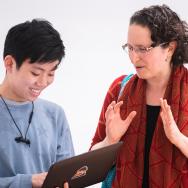Varun Ahluwalia, Gregory Rassolov, Brooke Weigel and Alexander Wolfson have been named the 2019 winners of the Wayne C. Booth Prize for Excellence in Teaching, awarded annually to graduate students for outstanding instruction of undergraduates.
Students and faculty in the College nominated the recipients for the prize, which was established in 1991 in honor of Booth, PhD’50, the late UChicago faculty member who was one of the 20th century’s most influential literary critics.
In addition to the Booth Prize, the University recently announced faculty winners of the Llewellyn John and Harriet Manchester Quantrell Awards, believed to be the nation’s oldest prize for undergraduate teaching; and the Faculty Awards for Excellence in Graduate Teaching and Mentoring, which honor faculty for their work with graduate students.
Learn more about this year’s Booth Prize recipients below:
Varun Ahluwalia
Before coming to UChicago for the Harris School’s Master of Public Policy program, Varun Ahluwalia was a public servant back in India. He worked in diverse roles in the federal government, from an early position with the central police force to his most recent job as the deputy accountant general for the northern province of Punjab.
Though he has a background in mechanical engineering, Ahluwalia has focused his studies at UChicago around economics, teaching the economics core sequence to undergrads and a microeconomics course to business students at Chicago Booth. Just as his studies will help him enhance his public sector work, Ahluwalia hopes his students find practical utility in the material, outside the classroom.
“I hope that the students have the patience and resolve to internalize the larger concepts, rather than being overly concerned with their scores.” Ahluwalia explained.
Ahluwalia has found his academic studies at the Harris School to be formative, as he prepares for future roles both in academia and the Indian government. “I hope to eventually earn a PhD in public policy and economics, building a foundation of theory that can inform public policies in India.”
Gregory Rassolov
The son of theoretical chemistry professors, Gregory Rassolov has charted a similar course as his parents, majoring in chemistry at the California Institute of Technology and now pursuing a PhD in UChicago’s Department of Chemistry.
And while theoretical chemistry might be family tradition for Rassolov, he knows it’s a notoriously complicated subject for most undergrads to grasp. So in his role as a teaching assistant for the yearlong general chemistry sequence, Rassolov has enjoyed finding novel ways to engage with his students.
“When we began to cover the fundamentals of quantum mechanics, I spent a significant amount of time explaining concepts that can seem especially strange and mysterious the first time they’re introduced by using analogies and physical pictures that students can more easily comprehend—such as standing waves on a guitar string,” said Rassolov. “I feel like taking this sort of approach helps to demystify the subject material and make it less intimidating.”
Working directly with UChicago undergrads has cemented Rassolov’s desire to follow in his parents’ footsteps and become a professor once he completes his doctorate. Such a role would allow him to continue his inquiries into theoretical chemistry and help make chemistry more accessible for undergrads.
“I hope that when my students get a sense that the seemingly bizarre and daunting problems we study aren’t actually completely beyond their grasp, they find it inspiring and gain confidence in their abilities,” Rassolov said.
Brooke Weigel
Brooke Weigel’s passion for aquatic environments developed after spending summers at a lake in Wisconsin.
A PhD candidate in the Committee on Evolutionary Biology, she studies the functional role of symbiotic microbes living on giant kelp, with a long-term goal of conducting research that can positively impact the conservation and management of aquatic ecosystems.
At UChicago, Weigel has been a TA for a variety of courses, including a marine ecology course on campus as well as the marine invertebrates course at the UChicago-affiliated Marine Biological Laboratory in Woods Hole, Mass.
She noted the deep levels of interaction with students there: “This immersive teaching experience was a blast. I spent three weeks living with my students in a dormitory, eating all of our meals together and spending late nights in the lab scrutinizing tiny invertebrates in seawater tanks as we attempted to identify everything that we collected in the field that day (which sometimes totaled more than 40 species).”
In all of her courses, Weigel appreciates the hard work and passion that students bring. “The most rewarding teaching experiences stem from experiential learning, when students pursue independent research projects or term papers. When students become extremely invested in a topic, their discoveries are enjoyable for both of us: I learn along with them.”
Alexander Wolfson
Through self-designed courses at the intersection of gender studies and continental philosophy, Alexander Wolfson hopes to encourage students to re-examine their assumptions behind fundamental texts.
“I try to develop with my students reading and writing practices that both allow us to engage with the grounding discourses of ‘Western thought,’ while keeping a critical sensibility as to the social and political contexts of their production,” said Wolfson, a PhD candidate concentrating in the philosophy of religions.
Wolfson’s studies at the Divinity School concentrate on trans, queer, and feminist theory through the lens of late 20th- and early 21st-century French philosophy. Most of Wolfson’s teaching at UChicago has been through the Center for the Study of Gender and Sexuality, including courses such as “Taboo and Transgression” and “Trans Performativity.”
He enjoys teaching as a way to work through the questions and themes of his courses alongside his students.
“The students have been so generously willing to think alongside me, especially when the material veers into perplexing or sensitive matters,” Wolfson said. “Watching the students take on the class material and develop it in directions I would never have thought to examine has been especially exciting and intellectually rewarding.”
